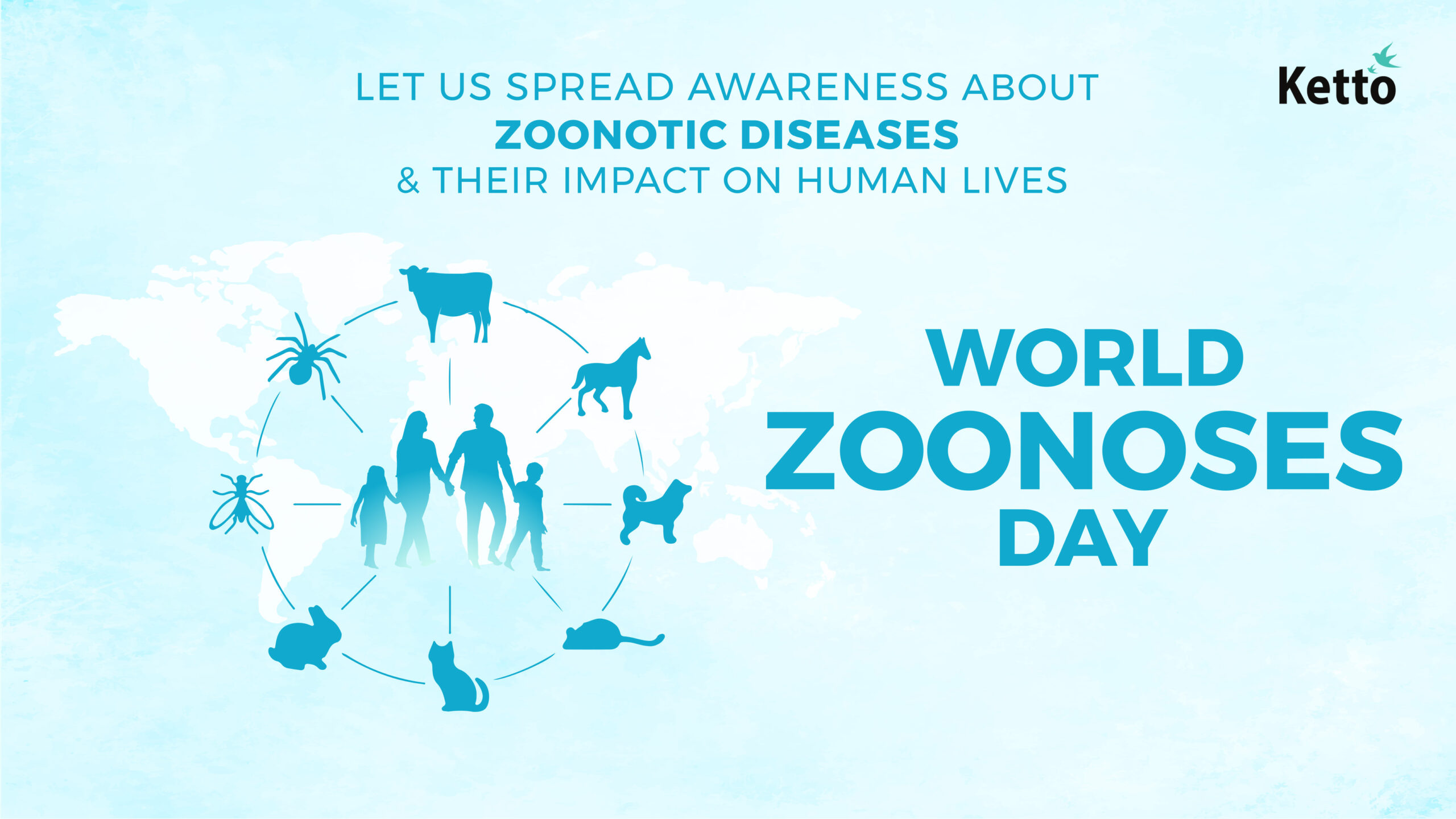World Zoonoses Day raises awareness about zoonoses, diseases that can jump from animals to humans. Through this article, we’ll share some powerful World Zoonoses Day quotes that you can share with your network to raise awareness about this day. We will also share a sample of a sample of a speech on World Zoonoses Day that you can give at your school or an event you’re attending, and a lot more.
We hope the information about World Zoonoses Day in this article helps you protect yourself and your furry or feathered friends. You’ll learn why this day matters, what “One Health” means, and how you can make a difference! So read on to know more about this day.

World Zoonoses Day – History
If we look at World Zoonoses Day history, it is intricately linked to a pivotal moment in scientific discovery. On July 6, 1885, French chemist and microbiologist Louis Pasteur successfully administered the first-ever vaccine for a zoonotic disease – rabies. This marked a turning point in understanding and managing diseases transmitted from animals.
Prior to Pasteur’s groundbreaking work, rabies caused immense fear and devastation. The unpredictable nature of the disease, often leading to a swift and painful death, left communities feeling helpless. Pasteur’s rabies vaccine offered a glimmer of hope, proving that scientific advancements could effectively combat zoonotic threats.
The establishment of World Zoonoses Day in 2007 served as a tribute to Pasteur’s legacy. It recognised the ongoing need for research and development in the fight against zoonotic diseases. On July 6, World Zoonoses Day is celebrated in order to cement the connection between this annual event and the pivotal role of vaccination in preventing zoonotic illnesses.
Today, World Zoonoses Day serves as a reminder that scientific advancements, coupled with global collaboration, are crucial for staying ahead of emerging zoonotic threats. By understanding World Zoonoses Day history, we appreciate the ongoing importance of scientific research, public health initiatives, and responsible animal ownership practices in safeguarding human and animal health.
World Zoonoses Day Theme
The World Zoonoses Day theme hasn’t been announced yet (as of June 27, 2024). However, past themes provide valuable insight into the focus of this global event. Every year, the World Zoonoses Day theme consistently highlights the importance of collaboration in addressing zoonotic threats.
Taking a look at past themes:
Here’s a glimpse into past World Zoonoses Day themes that underscore the collaborative spirit:
-
2023: One World, One Health: Prevent Zoonoses! This World Zoonoses Day theme emphasises the interconnectedness of human, animal, and environmental health. It highlights the need for collaboration across various sectors to effectively prevent zoonotic diseases.
-
2022: Together, We Can Build a Rabies-Free World This theme specifically focuses on rabies, a zoonotic disease with devastating consequences. It emphasises the importance of international collaboration in implementing vaccination programs and responsible pet ownership practices.
-
2021: Closing the Gaps, Reducing the Risk: Zoonoses and a One Health Approach This World Zoonoses Day theme recognises that vulnerabilities in our healthcare systems can create opportunities for zoonotic outbreaks. It emphasises the need for collaboration to identify and address these gaps, ultimately reducing the risk of zoonotic diseases.
By examining past themes, we understand that World Zoonoses Day consistently promotes a collaborative spirit. It highlights the importance of working together across borders and disciplines to prevent zoonotic diseases and safeguard global health. World Zoonoses Day underscores the importance of collaborative efforts in shaping a healthier future for humans and animals alike.
World Zoonoses Day Speech
By giving a World Zoonoses Day speech on this day, you can emphasise the importance of collaboration between veterinary and public health sectors, highlight past successes, and call for continued vigilance in preventing zoonotic outbreaks. Here, we’ve provided you with a sample of a World Zoonoses Day speech that you can give at your school, college or at an event you’re attending on this day.
‘Ladies and Gentlemen,
Good [morning/afternoon/evening],
Today, we gather here on 6 July, World Zoonoses Day, to reflect on a critical aspect of global health—zoonotic diseases. These diseases, which are transmitted between animals and humans, pose significant challenges to both public health and animal welfare worldwide.
Firstly, let us acknowledge the importance of collaboration between the veterinary and public health sectors. Together, these fields play a crucial role in identifying, preventing, and managing zoonotic diseases. By working hand in hand, we can ensure early detection of outbreaks, swift response measures, and effective communication to mitigate the impact on both human and animal populations.
Throughout history, we have made remarkable strides in combating zoonoses. From the development of vaccines to the implementation of surveillance systems, our collective efforts have saved countless lives and prevented widespread pandemics. Today, we commemorate these achievements as evidence of what dedication and collaboration can accomplish.
However, our work is far from over. As we celebrate past achievements, we must also acknowledge the challenges that lie ahead. Zoonotic diseases continue to evolve, presenting new threats that require adaptive strategies and innovative solutions. Vigilance is our greatest asset in this ongoing battle. By staying vigilant, proactive, and well-informed, we can anticipate emerging threats and protect the health of both humans and animals.
On this World Zoonoses Day, let us reaffirm our commitment to global health security. Let us pledge to strengthen partnerships, enhance surveillance capabilities, and promote awareness at every level of society. Together, we have the power to prevent outbreaks, protect vulnerable populations, and build a healthier, more resilient world.
Thank you all for your dedication to this important cause. Together, let us continue our journey towards a future where zoonotic diseases are no longer a threat to our well-being.
Thank you.’
We hope this World Zoonoses Day speech has provided you with inspiration and insight into the importance of World Zoonoses Day. Together, let’s amplify awareness, cultivate collaboration, and implement meaningful actions to protect the health of our communities and our planet.
World Zoonoses Day Quotes
“Healthy animals mean healthy humans – celebrate World Zoonoses Day!” – Anonymous.
“Prevention is better than cure, especially when it comes to zoonotic diseases.” – Unknown.
“On World Zoonoses Day, let’s pledge to protect both human and animal health.” – Anonymous.
“The fight against zoonoses requires global cooperation and awareness.” – Author Unknown.
We hope these World Zoonoses Day quotes have inspired you to reflect on the interconnectedness of human and animal health on World Zoonoses Day. Together, let’s raise awareness and take proactive steps towards a healthier future for all species.
Importance of World Zoonoses Day
You may be wondering or asking yourself why World Zoonoses Day is celebrated. Read on to find out why. The importance of World Zoonoses Day stems from its essential role in increasing awareness about zoonotic diseases, which are infections that can spread between animals and humans. These diseases not only pose significant threats to public health but also impact agricultural economies and biodiversity. By highlighting the interconnectedness of human and animal health, World Zoonoses Day promotes collaboration between veterinary and public health sectors to prevent and control outbreaks.
The importance of World Zoonoses Day is highlighted through its yearly observance, educating communities about the risks of zoonotic diseases and promoting preventive measures like vaccination, good hygiene practices, and responsible pet care. It provides a platform for addressing emerging zoonotic threats and exchanging best practices in disease surveillance and response.
Moreover, the importance of World Zoonoses Day fosters global solidarity in addressing health challenges that transcend borders, reinforcing the importance of World Zoonoses Day in international cooperation in disease control efforts. Celebrating World Zoonoses Day raises public consciousness about the impact of zoonotic diseases on global health security and underscores the need for sustained investments in research, surveillance, and capacity-building. By comprehending and tackling these challenges, we can aim for a future that is safer and healthier for both humans and animals.
World Zoonoses Day Celebration
Celebrated on July 6, World Zoonoses Day is a day dedicated to raising awareness about zoonotic diseases and celebrating global efforts to combat them. The World Zoonoses Day celebration serves as a reminder of the crucial importance of understanding and preventing diseases that can pass between animals and humans. This day is marked by various activities and events worldwide aimed at educating communities and fostering collaboration between veterinary and public health sectors.
The World Zoonoses Day celebration includes educational seminars, workshops, and awareness campaigns that highlight how zoonotic diseases affect both human and animal communities. In many countries, local health departments organise public events such as health fairs, where experts provide information about World Zoonoses Day and offer guidance on disease prevention and responsible pet ownership. These events often feature interactive exhibits, demonstrations, and distribution of educational materials to engage attendees of all ages.
In addition to educational initiatives, the World Zoonoses Day celebration may include veterinary clinics offering discounted vaccinations for pets, emphasising the role of vaccination in preventing zoonotic diseases. Community organisations and schools also participate by organising awareness drives and student projects focused on zoonotic disease prevention and environmental health.
On July 6th of each year, communities come together to reflect on past achievements and renew their commitment to addressing current challenges related to zoonotic diseases. The World Zoonoses Day celebration not only commemorates the historic significance of this day but also serves as a call to action for continued efforts in disease prevention and control. It provides an opportunity for stakeholders from various sectors to exchange knowledge, collaborate on research initiatives, and advocate for policies that promote animal and human health.
Through the World Zoonoses Day celebration, stakeholders reaffirm their dedication to protecting public health and preserving biodiversity. By raising awareness by spreading information about World Zoonoses Day and sharing meaningful World Zoonoses Day quotes, participants inspire collective action towards a safer and healthier future for all species.
The global observance of World Zoonoses Day underscores the vital connections between human health, animal well-being, and environmental sustainability. It encourages governments, organisations, and individuals worldwide to prioritise surveillance, research, and education initiatives aimed at preventing zoonotic disease outbreaks. By fostering collaboration and sharing knowledge during the World Zoonoses Day celebration, we enhance our collective capacity to identify, respond to, and reduce the impact of zoonotic diseases worldwide.
Facts associated with World Zoonoses Day & zoonotic diseases
-
Cross-Species Transmission: Zoonotic diseases can jump from animals to humans and vice versa. Some diseases, like avian influenza (bird flu), can infect both birds and humans.
-
Historical Impact: The Black Death, one of the deadliest pandemics in history, resulted from the bacterium Yersinia pestis, transmitted from rodents to humans via fleas.
-
Wildlife Reservoirs: Many zoonotic diseases, such as Ebola and Lyme disease, originate from wildlife reservoirs. Understanding and managing these reservoirs is crucial for disease control.
-
Modern Challenges: Urbanisation and human encroachment into wildlife habitats increase the risk of zoonotic disease transmission. Conservation efforts also play a role in disease prevention.
-
Global Surveillance: Organisations like the Global Virome Project aim to identify and monitor viruses in wildlife that have the potential to spill over into human populations, enhancing global health security.
-
Antibiotic Resistance: Some zoonotic bacteria, such as Salmonella and Campylobacter, are becoming resistant to antibiotics, posing challenges for treatment and control.
-
Cultural Impacts: Traditional practices like bushmeat hunting in Africa and Asia can heighten the risk of zoonotic diseases spreading from wild animals to humans.
-
Pandemic Potential: The COVID-19 pandemic, caused by the SARS-CoV-2 virus, highlighted the rapid global spread and devastating impact of zoonotic diseases on public health, economies, and societies worldwide.
-
One Health Approach: This comprehensive approach integrates human, animal, and environmental health to effectively tackle zoonotic diseases, highlighting the interdependence of these interconnected systems.
-
Vaccine Development: Effective in managing zoonotic diseases such as rabies and brucellosis, vaccines demonstrate the importance of preventive measures in disease control.
These facts provide a deeper insight into the complexities and challenges associated with zoonotic diseases and underscore the importance of ongoing efforts in research, prevention, and global collaboration.
FAQs about World Zoonoses Day
Q. World Zoonoses Day is celebrated on what date?
Ans. It is celebrated on July 6. World Zoonoses Day is celebrated to commemorate the anniversary of Louis Pasteur administering the first successful rabies vaccine to a human, marking a significant milestone in the prevention of zoonotic diseases.
Q. Do you know why World Zoonoses Day is celebrated?
Ans. World Zoonoses Day is celebrated to raise awareness about zoonotic diseases, which are infections that can be transmitted between animals and humans. The day emphasises the importance of understanding these diseases, their impact on public health, and the need for collaboration between veterinary and public health sectors.
Q. What does World Zoonoses Day mean?
Ans. World Zoonoses Day means understanding the interconnectedness between human, animal, and environmental health. This day emphasises the risks associated with zoonotic diseases and underscores the significance of preventive measures, including vaccination, proper hygiene, and responsible pet ownership.
Q. Can you provide a list of World Zoonoses Day themes list?
Ans. World Zoonoses Day themes vary each year, focusing on different aspects of zoonotic diseases and their prevention. Past themes have included “Zoonoses: Bridging the Gap to Prevent Future Outbreaks” and “One Health: Zoonoses and the Environment.”
Conclusion
Observed on July 6, World Zoonoses Day holds profound significance in the realm of global health. This day commemorates Louis Pasteur’s groundbreaking work with the first rabies vaccine in 1885, marking a pivotal moment in our understanding and management of zoonotic diseases. In this article, we’ve talked about World Zoonoses Day history and themes over the years. We have also mentioned how World Zoonoses Day is celebrated on a grand scale and how it is celebrated.As we reflect on the lessons from World Zoonoses Day, let us continue to advocate for global health security, strengthen partnerships across sectors, and empower communities to take informed actions. As we strive for a safer, healthier future through initiatives like World Zoonoses Day, it’s crucial to translate awareness into action. One impactful way to continue supporting global health efforts is through being a part of Ketto SIP. By contributing as little as Rs 100 a month, you can empower NGOs to provide food, shelter, and essential medical care to homeless animals, easing their suffering and promoting animal welfare. Additionally, fundraising efforts play a pivotal role in addressing the financial challenges of veterinary expenses and pet surgeries, ensuring that every animal receives the necessary medical attention. By contributing to animal crowdfunding fundraisers on Ketto, you can ease the financial strain that pet owners face and help give their beloved fur babies a chance at recovery. Together, these actions embody our commitment to creating a compassionate and resilient world for both humans and animals alike.
- World Zoonoses Day: Quotes, Theme,History, Importance, Celebrations & More! – July 5, 2024
- Heart Transplant Crowdfunding: Hope for Heart Transplant Patients – June 27, 2024
- International Olympic Day: Quotes, Date, History, Celebrations And More! – June 20, 2024
#World #Zoonoses #Day #Quotes #ThemeHistory










